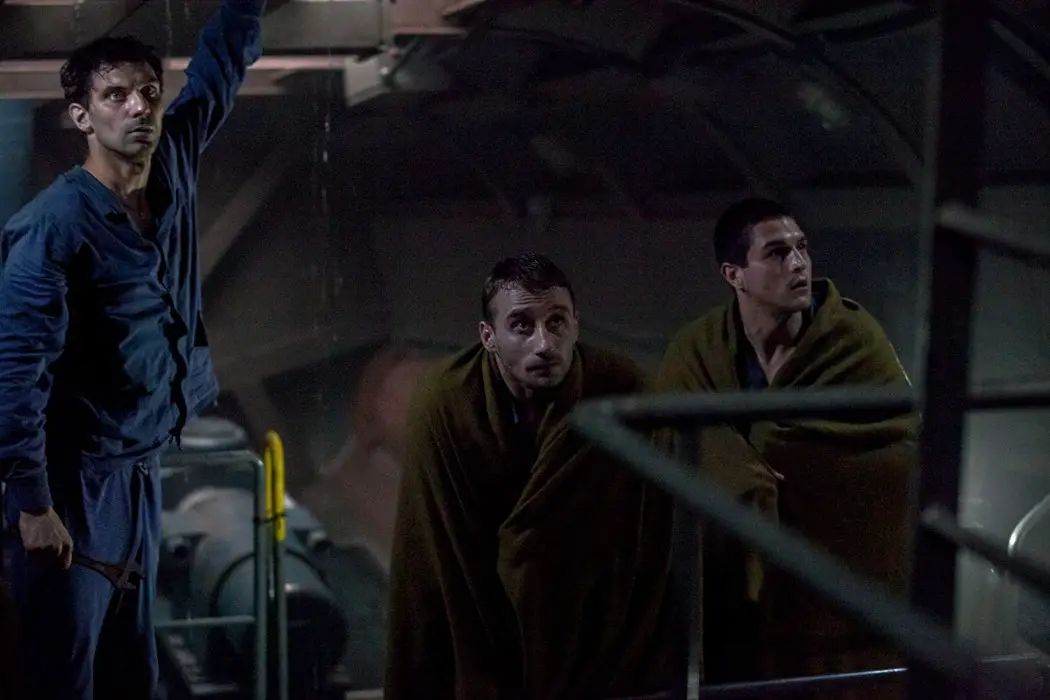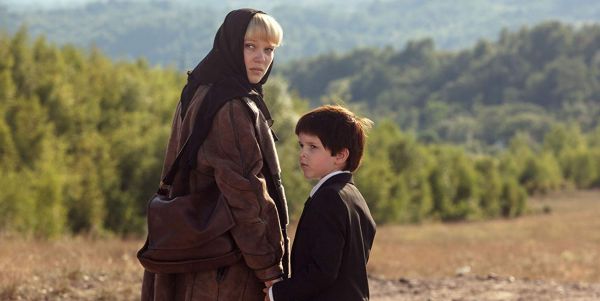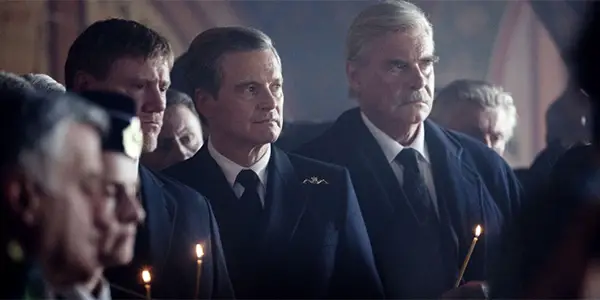KURSK: The Command That Ended In Tragedy

Bree is a journalism major living in Toronto. She is…
Thomas Vinterberg ’s Kursk (The Command) is a heart-wrenching drama detailing the disastrous explosion of a Russian submarine that sank to the bottom of the Barents Sea in 2000, where 118 men lost their lives. A haunting waiting game, the two dozen survivors of the initial torpedo explosions wait for rescue as their oxygen supply drops dangerously fast while above sea, Russian Navy officials work to save them. However, due to arrogant pride and an unwillingness to accept assistance from foreign navies, the wait would never meet salvation.

The film begins with a band of sailors looking to scrounge enough money for their friend’s wedding, decidedly selling their watches in order to purchase enough champagne for the festivities. During the wedding itself, we witness the crew’s close bond, as if brothers of the sea, a family dedicated to their country. The next day, they descend into the deep sea to conduct a weapon test on missiles and torpedoes, a naval mission that had not been attempted in Russia for nearly a decade prior.
As the internal temperature of a torpedo reaches a deadly level, permission is denied to take action, thus a ticking time bomb begins. Merely seconds later, a crew member tells another to pray and when he replies that he is not a religious man, its as if God swipes an angry fist, brandishing it down upon the Kursk as the torpedo explodes in a fiery rage.
Above and Below
Mikhail Averin ( Matthias Schoenaerts ) leaves behind his three-year-old son and pregnant wife on land as he works tirelessly to keep himself and his crew alive in a wet and chilling compartment of the Kursk. Having to fight off hypothermia and rising water levels, the crew scrambles to collect oxygen cartridges; found on a mission into the destroyed submarine compartments flooded with dark abyss. The element that water plays is eerily calm and timeless as Averin cuts through the water in multiple shots. Despite the urgency, the serenity of this scene only adds to the momentum of the film.

Averin takes the lead as his determination and level head is what keeps the men stable, however, above the surface, even more chaotic complications ensue. It is frustrating and difficult to watch naval authorities take 16 hours to locate the marooned submarine and when it is finally discovered, recovery is futile due to the poor structural conditions of the rescue submersive. The rapidly failing equipment and multiple attempts to connect to the submarine condemn the survivors to stay stranded at the bottom of the sea, hope quickly dwindling.
With just under two hours of cinematic production, Vinterberg creates two sides to a horrific story, that of the survivors and of the panicked families left in the dark by bureaucratic arrogance. Despite some run on scenes, Vinterberg is still able to bring suspense to the screen through his well crafted depiction of the crew’s moments together as their oxygen levels slowly drain with each bated breath.
A Child’s Courage
One of the more remarkable performances delivered included that of young Artemiy Spiridonov , who plays Averin’s son, Misha. Throughout the entirety of the film, Misha is in the likeness of a fly on a wall, observing but not speaking nor giving light to what he may be thinking. He witnesses his father’s submarine descend into the ocean, his relatives argue with Russian Navy officials in town meetings and the immediate frantic wildness of everyone around him. His face is emotionless yet drips with foreshadowing of the horrors to come, his presence an overwhelming representation of sorrow and a numbness overlooked in the midst of a great uproar.

Misha is also well beyond his years, seeming to accept his father’s death even before it is confirmed, as if this child realized the bigger picture, how grave the circumstances were. He once asked a simple yet defining question to his mother whether his father had died or if he survived but could not be saved. Misha’s role in the film not only represents a family broken by tragedy but a grievance and distrust in the Russian Navy, who in his eyes, failed his father and the rest of his crew.
A defining moment for anyone would be Misha’s unflinching and unforgiving snub to the Russian Navy admiral played by Max von Sydow , where he refuses to shake the man’s hand, which triggers the remaining children to also refuse a handshake. His actions are strong and for the 71 children who lost a father in the Kursk epidemic, a symbol that this film entailed to be digested in full.
Poignant Performances
As Misha portrayed the silent and brooding son struggling with the truth of his father’s fate, other notable performances come from Colin Firth as Commodore David Russell, a British Royal Navy officer who extended his resources and aid to save the surviving men, only to be rejected. Firth maintains his stoic character but the inner struggle is recognizable when his composure falters once the tragic news is shared. Also, Averin’s pregnant wife, played by Léa Seydoux is a catalyst for the enragement ensued with how poorly the sailors’ families were treated by authorities during the emergency.
All while being fed weak information about the status of their loved ones trapped beneath the water’s surface, they were blatantly lied to in order to keep wraps on the magnitude of the situation. Seydoux’s empowering performance as a concerned wife ignites united fronts from the town in one meeting as she delivers a heart-tugging final speech.
Kursk: Conclusion
Kursk (The Command) brings attention to a tragedy that gained minimal coverage in a powerful burst of courage. A film with gripping scenes of camaraderie and vital attention to the truth grants the audience a moment to reflect.
What impact do you think disaster films such as Kursk (The Command) have on audiences? Let us know your thoughts in the discussion below!
Kursk (The Command) was released in the US on June 21, 2019.
Does content like this matter to you?
Become a Member and support film journalism. Unlock access to all of Film Inquiry`s great articles. Join a community of like-minded readers who are passionate about cinema - get access to our private members Network, give back to independent filmmakers, and more.
Bree is a journalism major living in Toronto. She is a passionate cinephile with a love for 70’s music and can be found in any nearby bookstore. Bree aspires to travel and share her love of story telling while embracing inclusivity in her writing.












